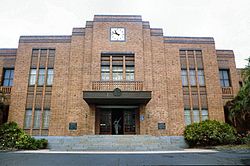Rockhampton Town Hall
| Rockhampton Town Hall | |
|---|---|

Rockhampton Town Hall, 2008
|
|
| Location | 232 Bolsover Street, Rockhampton, Rockhampton Region, Queensland, Australia |
| Coordinates | 23°22′55″S 150°30′49″E / 23.3819°S 150.5137°ECoordinates: 23°22′55″S 150°30′49″E / 23.3819°S 150.5137°E |
| Design period | 1919 - 1930s (interwar period) |
| Built | 1939 - 1941 |
| Built for | Rockhampton City Council |
| Architect | Hockings & Palmer |
| Architectural style(s) | Classicism |
| Official name: Rockhampton Town Hall, Rockhampton City Hall, Rockhampton Council Chambers | |
| Type | state heritage (landscape, built) |
| Designated | 29 April 2003 |
| Reference no. | 601572 |
| Significant period | 1930s-1940s (historical) 1939 - ongoing (social) 1940s (fabric) |
| Significant components | views to, foyer - entrance, furniture/fittings, office/s, garden/grounds, council chamber/meeting room, trees/plantings |
| Builders | John Hutchinson |
Rockhampton Town Hall is a heritage-listed town hall at 232 Bolsover Street, Rockhampton, Rockhampton Region, Queensland, Australia. It was designed by Hockings & Palmer and built from 1939 to 1941 by John Hutchinson. It is also known as Rockhampton City Hall and Rockhampton Council Chambers. It was added to the Queensland Heritage Register on 29 April 2003.
Rockhampton emerged as an important Queensland regional centre during the 1850s and 1860s. This development took on especial prominence after the discovery of the mining wealth at Mount Morgan in 1882. The additional affluence that flowed on for Rockhampton fuelled a rapid expansion of public and private buildings and residences throughout the City and surrounds. This building boom allowed for many grand places to be constructed, especially renowned along the commercial and government sector near the wharves on Quay Street, to the many elite residences found on "The Range". Despite this building expansion into the 1900s, Rockhampton never achieved a purpose built Town Hall until 1941.
An 1878 reference to premises utilised by Rockhampton's Council, stated:
"Our municipal edifices are more useful than ornamental. The Council Chambers (by one aspiring Mayor denominated "Temporary Town Hall") are of wood and iron, lined, in an airy spot, and well verandahed; on an adjoining reserve the Fire Engine Shed, and Kerosene Store, are erected."
On 21 June 1897, a foundation stone for the future town hall was laid by a Rockhampton Mayor Mr Littler to mark the occasion of Queen Victoria's Diamond Jubilee. At this occasion Mr Littler let it be known that the Council could not proceed immediately with the building, but felt that construction would probably be able to commence some time over the next ten years. Although occasionally referred to in election speeches through the ensuing years, it wasn't until 1936 that the Council decided to invite designs for a town hall.
Seven designs were submitted by Rockhampton and Brisbane architects, but for various reasons, particularly financial, none of these designs were found satisfactory. It wasn't until an amended design, originally submitted by the Rockhampton architectural firm of Hockings and Palmer, was accepted and the contract let to the firm of John Hutchinson and Sons (of Brisbane), before construction was able commence.
...
Wikipedia


